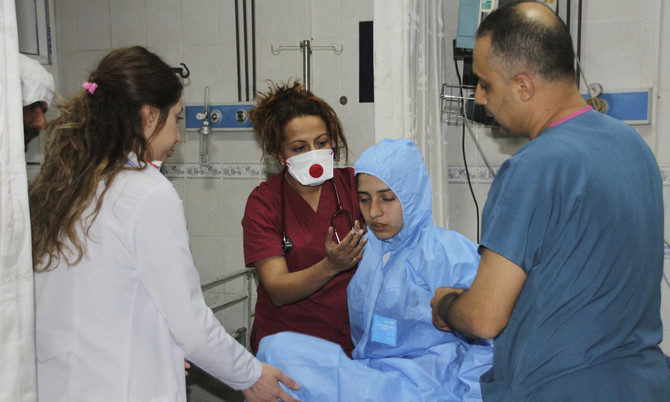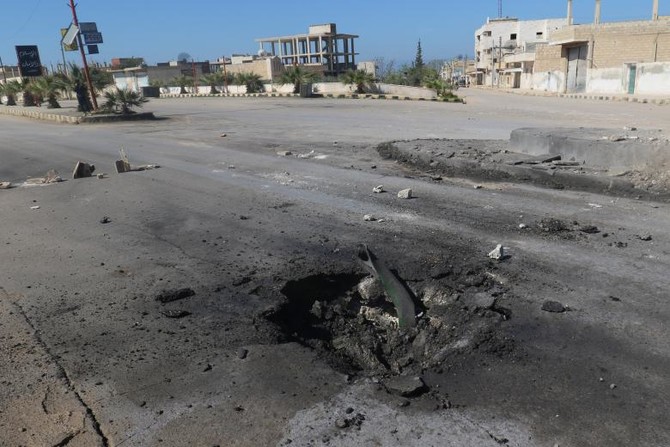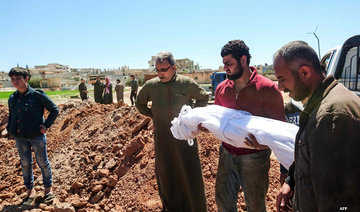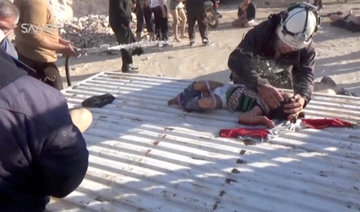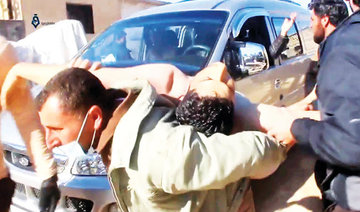BEIRUT, Lebanon: Turkey said Thursday that autopsies of Syrian victims from this week’s assault in Syria’s Idlib province show they were subjected to chemical weapons as France’s foreign minister called for the prosecution of President Bashar Assad’s government amid growing international outrage over the assault that activists say killed 86 people.
Damascus maintains it didn’t use chemical weapons, instead blaming the rebels for stockpiling the deadly substance.
“I stress, once again, that the Syrian Arab Army did and will not use such weapons even against the terrorists who are targeting our people,” Syria’s Foreign Minister Walid Moallem told reporters in Damascus.
In Turkey, state-run Anadolu and the private DHA news agencies quoted Justice Minister Bekir Bozdag as saying that “it was determined after the autopsy that a chemical weapon was used.”
Turkish officials say that close to 60 victims of the attack were brought to Turkey for treatment and three of them died.
Tuesday’s attack happened just 100 kilometers (60 miles) from the Turkish border, and the Turkish government — a close ally of Syrian rebels — set up a decontamination center at a border crossing in the province of Hatay, where the victims were initially treated before being moved to hospitals.
Russia’s Defense Ministry said the toxic agents were released when a Syrian airstrike hit a rebel chemical weapons arsenal and munitions factory on the town’s eastern outskirts.
At the press conference in Damascus, Moallem also echoed that statement, saying the Syrian army bombed a warehouse belonging to Al-Qaeda’s branch in Syria which contained chemical weapons. He did not say whether the government knew in advance that the warehouse contained chemical weapons.
Asked whether his country would give access to a fact-finding mission over the use of chemical weapons, he said: “Our experiences with international investigating committees were not encouraging, because they come out of Damascus with certain indications which then change at their headquarters.”
He said Damascus wants guarantees that any investigation would be impartial and non-politicized. He also said such a committee should start from Damascus and not from Turkey. “Once we reach convincing answers we will give our answer,” he said.
The area of the town is difficult to access and as more time passes in the aftermath of the attack, it will be increasingly difficult to determine exactly what happened.
Turkish media have reported that World Health Organization experts took part in the autopsies of Syrian victims conducted in a hospital in the Turkish city of Adana late Wednesday.
In France, Foreign Minister Jean-Marc Ayrault urged for a resumption of Syrian peace talks and said he wants Assad’s government prosecuted over its alleged use of chemical weapons.
He told CNews television on Thursday that a new UN resolution and Syrian peace negotiations should be a top priority — not rushing into new military interventions. Ayrault said that “France is still seeking to talk with its partners on the Security Council ... Russia in particular.”
“These crimes must not remain unpunished. ... One day, international justice will rule on Assad,” Ayrault said.
Russia argued at a UN Security Council meeting on Wednesday against holding Assad’s government responsible for the Idlib attack. The US ambassador to the United Nations, Nikki Haley, warned that the Trump administration would take action if the Security Council did not.
US President Donald Trump and other world leaders said the Syrian government was to blame, but Moscow, a key ally of Assad, said the assault was caused by a Syrian airstrike that hit a rebel stockpile of chemical arms.
Early US assessments showed the use of chlorine gas and traces of the nerve agent sarin in the attack Tuesday that terrorized Khan Sheikhoun, according to two US officials who weren’t authorized to speak publicly on the matter and demanded anonymity.
The effects of the attack overwhelmed hospitals around the town, leading paramedics to send patients to medical facilities across rebel-held areas in northern Syria, as well as to Turkey. The Turkish Health Ministry said three victims died receiving treatment inside its borders. The Britain-based Syrian Observatory for Human Rights monitoring group put the toll so far at 86 killed.
Victims of the attack showed signs of nerve gas exposure, the World Health Organization and Doctors Without Borders said, including suffocation, foaming at the mouth, convulsions, constricted pupils and involuntary defecation. Paramedics were using fire hoses to wash the chemicals from the bodies of victims.
Medical teams also reported smelling bleach on survivors of the attack, suggesting chlorine gas was also used, Doctors Without Borders said.
The magnitude of the attack was reflected in the images of the dead — children piled in heaps for burial, a father carrying his lifeless young twins.
The visuals from the scene were reminiscent of a 2013 nerve gas attack on the suburbs of Damascus that left hundreds dead and prompted an agreement brokered by the US and Russia to disarm Assad’s chemical stockpile. Western nations blamed government forces for that attack, where effects were concentrated on opposition-held areas.
___
Fraser reported from Ankara, Turkey. Associated Press writer Albert Aji contributed to this report from Damascus, Syria.
Syria autopsies show chemical weapons used in attack — Turkey
Syria autopsies show chemical weapons used in attack — Turkey
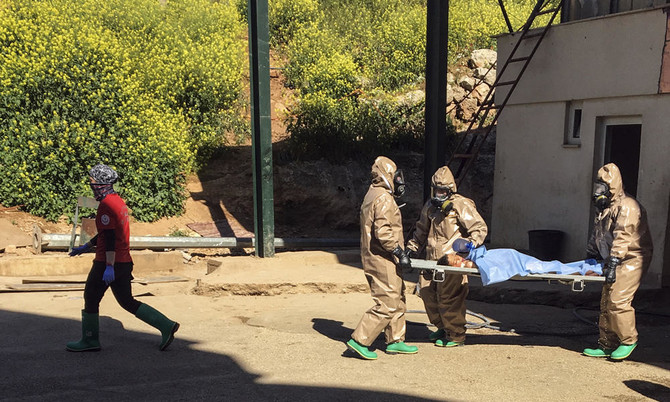
Palestinian health ministry says 4 killed in Israeli West Bank strike

RAMALLAH: The Palestinian health ministry said Thursday that an Israeli air strike on a car killed four Palestinians and wounded three near the occupied West Bank city of Tulkarem.
The ministry announced that the Palestinians were killed “as a result of the (Israeli) bombing of a vehicle in Tulkarem camp,” which the Israeli army did not immediately confirm to AFP.
Turkiye, Iran leaders at Muslim summit in Cairo

- Relations between Egypt and Iran have been strained for decades, but diplomatic contacts have intensified since Cairo became a mediator in the war in Gaza
CAIRO: The leaders of Turkiye and Iran were in Egypt on Thursday for a summit of eight Muslim-majority countries, meeting for the first time since the ouster of Syria’s president Bashar Assad.
Turkiye historically backed the opposition to Assad, while Iran supported his rule.
The gathering of the D-8 Organization for Economic Cooperation, also known as the Developing-8, was being held against a backdrop of regional turmoil including the conflict in Gaza, a fragile ceasefire in Lebanon and unrest in Syria.
In a speech to the summit, Turkiye’s Recep Tayyip Erdogan called for unity and reconciliation in Syria, urging “the restoration of Syria’s territorial integrity and unity.”
He also voiced hope for “the establishment of a Syria free of terrorism,” where “all religious sects and ethnic groups live side by side in peace.”
Iranian President Masoud Pezeshkian urged action to address the crises in Gaza, Lebanon and Syria, saying that it is a “religious, legal and human duty to prevent further harm” to those suffering in these conflict zones.
Pezeshkian, who arrived in Cairo on Wednesday, is the first Iranian president to visit Egypt since Mahmoud Ahmadinejad, who visited in 2013.
Relations between Egypt and Iran have been strained for decades, but diplomatic contacts have intensified since Cairo became a mediator in the war in Gaza.
Foreign Minister Abbas Aragchi visited Egypt in October, while his Egyptian counterpart Badr Abdelatty traveled to Tehran in July to attend Pezeshkian’s inauguration.
Ahead of the summit, the Iranian top diplomat said he hoped it would “send a strong message to the world that the Israeli aggressions and violations in Gaza, Lebanon and Syria” would end “immediately.”
Erdogan was in Egypt earlier this year, and discussed with President Abdel Fattah El-Sisi economic cooperation as well as regional conflicts.
Established in 1997, the D-8 aims to foster cooperation among member states, spanning regions from Southeast Asia to Africa.
The organization includes Egypt, Turkiye, Iran, Nigeria, Pakistan, Bangladesh, Indonesia and Malaysia as member states.
Iraq begins repatriating Syrian soldiers amid border security assurances

DUBAI: Iraq has begun the process of returning Syrian soldiers to their home country, according to state media reports on Wednesday.
Lt. Gen. Qais Al-Muhammadawi, deputy commander of joint operations, emphasized the robust security measures in place along Iraq’s borders with Syria.
“Our borders are fortified and completely secure,” he said, declaring that no unauthorized crossings would be permitted.
Muhammadawi said that all border crossings with Syria are under tight control, stating: “We will not allow a terrorist to enter our territory.”
Turkiye won’t halt Syria military activity until Kurd fighters ‘disarm’

ISTANBUL: Turkiye will push ahead with its military preparations until Kurdish fighters “disarm,” a defense ministry source said Thursday as the nation faces an ongoing threat along its border with northern Syria.
“Until the PKK/YPG terrorist organization disarms and its foreign fighters leave Syria, our preparations and measures will continue within the scope of the fight against terrorism,” the source said.
Hamas says Israeli strikes in Yemen ‘dangerous development’

GAZA: Palestinian militant group Hamas said Thursday that Israel’s strikes in Yemen after the Houthi rebels fired a missile at the country were a “dangerous development.”
“We regard this escalation as a dangerous development and an extension of the aggression against our Palestinian people, Syria and the Arab region,” Hamas said in a statement as Israel struck ports and energy infrastructure in Yemen after intercepting a missile attack by the Houthis.



